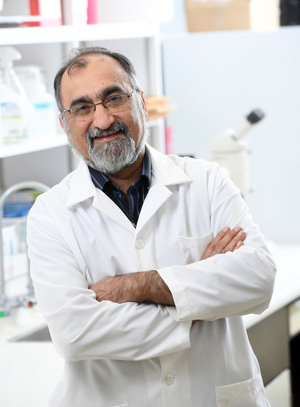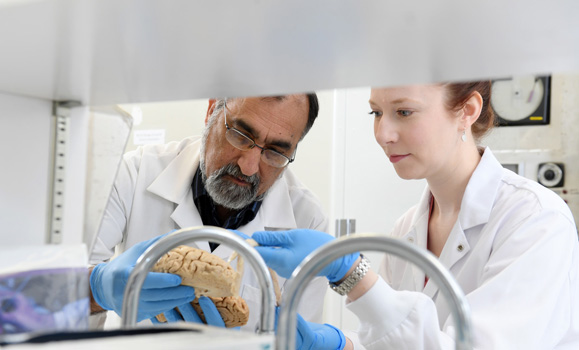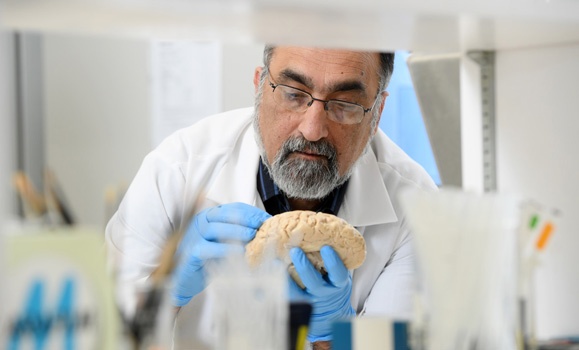When Dr. Sultan Darvesh (MDŌĆÖ88) was completing his residency in Neurology with ║┌┴Ž│į╣Ž═°ŌĆÖs Faculty of Medicine in the early 1990s, he often asked his mentors for advice on what to research in his medical career.
ŌĆ£The consensus,ŌĆØ he recalls, ŌĆ£was that I should pick the most complicated, most difficult subject matter I could explore and focus on that, so I chose AlzheimerŌĆÖs disease.ŌĆØ
 Nearly 25 years later, Dr. Darvesh, a professor with the Division of Neurology, the Department of Medicine and the Department of Medical Neuroscience at Dalhousie, is on the verge of a significant breakthrough in combatting a disease that affects approximately 35 million people worldwide.
Nearly 25 years later, Dr. Darvesh, a professor with the Division of Neurology, the Department of Medicine and the Department of Medical Neuroscience at Dalhousie, is on the verge of a significant breakthrough in combatting a disease that affects approximately 35 million people worldwide.
Working with a team of researchers, he has developed a small radioactive molecule that can positively identify butyrylcholinesterase, an enzyme that plays a key role in the progression of AlzheimerŌĆÖs disease, in PET and SPECT scans. It could, he says, enable a definitive diagnosis of the disease in living patients, something that has never been possible before.
ŌĆ£Right now, the only way we can make a definitive diagnosis is during autopsy,ŌĆØ Dr. Darvesh says. ŌĆ£Typically, we can be 80 to 90 per cent certain that a patient has it, but by the time we make a diagnosis, many of the patientŌĆÖs brain cells have died and cannot be regenerated. Moreover, it means 20 per cent of the patients we enroll in related clinical trials do not have the disease, and that is problematic because many of these trials fail.ŌĆØ
ŌĆ£It lit a fire in me.ŌĆØ
The ability to make an early definitive diagnosis during life would not only facilitate research and development of therapies to combat this disease but also provide guidance to patients and their loved ones on how they can better manage the often-devastating impacts of AlzheimerŌĆÖs.
ŌĆ£To experience that kind of deterioration and not quite know whatŌĆÖs going on really turns peopleŌĆÖs lives upside down,ŌĆØ Dr. Darvesh says. ŌĆ£There are many issues to deal with from safety to day-to-day care. If we can provide patients and families with a diagnosis and education about the impacts of the disease, we can help them cope.ŌĆØ
Originally from Tanzania, Dr. Darvesh completed a PhD in organic chemistry in 1983 and a postdoctoral fellowship in molecular biology in 1984 at the University of New Brunswick before joining DalhousieŌĆÖs Neurology residency program. ŌĆ£The professors and scientists here were absolutely spectacular,ŌĆØ Dr. Darvesh says. ŌĆ£The mark of a great teacher is the ability to arouse a studentŌĆÖs curiosity, and that is what they did for me. Their enthusiasm for research was such that it lit a fire in me.ŌĆØ

Such was that fire that when it came time to start his academic and clinical career, Dr. Darvesh determined that ║┌┴Ž│į╣Ž═°was the best place to be. ŌĆ£From infrastructure to expertise, there is an environment here that is conducive to innovation and exploration,ŌĆØ Dr. Darvesh says. ŌĆ£Where you have that kind of good will, good things happen, and that is why I decided to do my AlzheimerŌĆÖs research here.ŌĆØ
One step closer
To date, Dr. Darvesh and his team have been able to demonstrate proof of principle for the radioactive molecule using mouse models to image the accumulation of butyrylcholinesterase-associated AlzheimerŌĆÖs disease pathology in the brain. Now, Dr. Darvesh is working to refine the molecule so that it can eventually undergo clinical trials.
ŌĆ£You canŌĆÖt put all your eggs in one basket, so we are synthesizing and evaluating many different classes of molecules to see which one will be most effective,ŌĆØ Dr. Darvesh says. ŌĆ£It has to be a better radiotracer, it has to get to the brain faster, and it has to stay there longer. It may seem like we are focused on only one thing, and to a degree we are, but there is a lot of work going on.ŌĆØ
That focus is presently razor sharp for Dr. Darvesh. He has no plans and no goal beyond perfecting this diagnostic tool. For him, this is not about leaving behind a legacy; this is about making a difference here and now.
ŌĆ£The ultimate goal is to find a cure for this disease,ŌĆØ Dr. Darvesh says. ŌĆ£If the steps we are taking at Dalhousie, small as they are, help other researchers to diagnose and develop therapies for AlzheimerŌĆÖs disease, that would be amazing. That is what I want to see in my lifetime.ŌĆØ
This article was originally published as part of the ║┌┴Ž│į╣Ž═°Alumni "Building a Better World" series. For more stories, .

